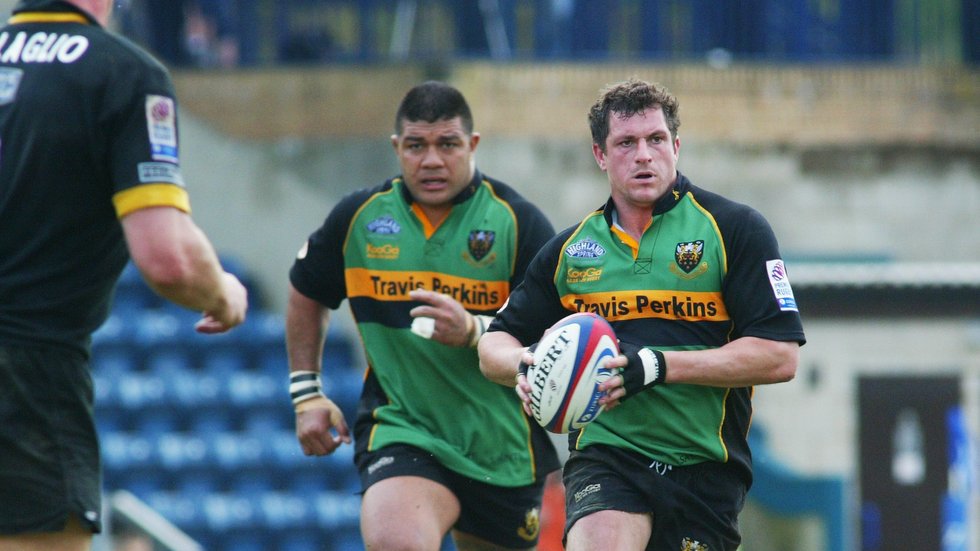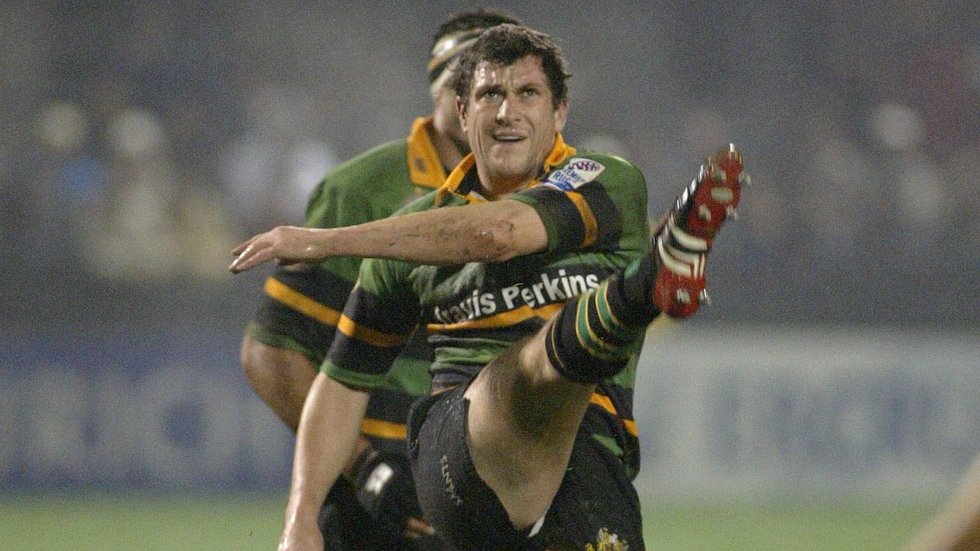- Played259
Bio
Years: 1993-2005
England caps: 32
British and Irish Lions tours: South Africa 1997
Head Coach 2006-2012
The look up at the posts. Back to the tee. The run-up, swing of the right leg and sweet ‘thud’ as boot hits ball. Up go the flags and the score board ticks over. This familiar routine happened nearly a thousand times in Paul Grayson’s 11-year career in black, green and gold as he played such an important role in the club’s ascent through the English and European game in the mid-to-late 1990s.
Of all the roles of any player in any rugby team, there is none quite as important as that of goal kicker. Throughout the history of the game a contest has been decided not necessarily by which team has scored the most tries, but who has had the most accurate goal kicker. It can be a thankless task, thousands of eyes trained on you, sometimes in silence, sometimes in a cacophony of noise, but where success is judged on one thing only - whether you can get the ball between the uprights and over the crossbar.
As with so many of his generation at Franklin’s Gardens, Grayson’s nest hour came in the 1999/2000 season. Not necessarily in the Heineken Cup final - although his name was the only one on the Saints’ scoresheet in the 9-8 win over Munster - but in the knockout matches which preceded that showpiece occasion. Lightning indeed struck twice, with first Wasps and then Llanelli Scarlets both downed by late, late penalties kicked by the metronomic Grayson. No one remembers the losers in those matches, only the winners, and for that the Saints faithful have Grayson to thank.
In a twist of fate, the 9-8 result between the Saints and Munster was also the scoreline in the match that propelled the Lancastrian into the rugby consciousness back in November 1992. At the time Grayson was steering the back line at Waterloo, who were drawn with the then-all conquering Bath in the Pilkington Cup.
The tie clashed with Australia’s end-of-tour match with the Barbarians, who had chosen Bath fly half Stuart Barnes and number eight Ben Clarke for their squad. Nevertheless the west countrymen felt confident enough - no doubt on the strength of a cup record of seven titles in 10 years - to release their men to the Barbarians. It was a decision that backfired spectacularly as Grayson’s three penalties saw second division Waterloo home to one of the greatest upsets in cup history, and the man himself on the road to the East Midlands and the club where he would spend the rest of his playing career.
The early years were certainly turbulent, the team getting relegated in 1995 despite a roster full of talent and Sir Ian McGeechan at the helm, although the Lions legend was a late arrival in the season. However from there it was certainly a case of moving on up, with the team demolishing the rest of Division Two en route to promotion and then working its way through the top flight. Saint after Saint was also receiving international recognition, and Grayson joined the likes of Matt Dawson, Tim Rodber and Nick Beal in the England side for the first time in December 1995.
The quartet were also selected by McGeechan alongside Gregor Townsend for the 1997 British and Irish Lions tour to South Africa, still the single biggest contingent of Saints on any one such trip in the club’s history.
Grayson would go on to make 32 appearances for England, scoring exactly 400 points and running out in the 1999 and 2003 Rugby World Cups, before he stepped down from the international game in May 2004.
Grayson had not been universally appreciated for his performances in the white shirt, but Sir Clive Woodward was effusive in his praise, saying “Paul has been a wonderful presence on the pitch these past nine years and I hope to see him return in a coaching capacity. He has my full respect.”
Woodward certainly had some foresight, because before the year was out Grayson was combining his playing commitments with coaching the Saints first team following the dismissal of Alan Solomons. Up to this point Grayson had been enjoying an Indian summer in his career inspired by Solomons’ predecessor, New Zealander Wayne Smith.
“The main thing from my perspective was that Wayne knew next to nothing about me; he was a stranger with no preconceptions,” Grayson told The Independent in 2002. “He gave me a clear idea of how I might develop my game and that clarity came from personal experience. Here was a former All Black telling me that he played his best rugby in the last couple of years of his career, when he knew what he needed to know and understood how to let it all come out.
“When he said: ‘You’ve told me what you think you can do, so go out and do it’, I was ready.”
Ready he might have been, but aside from the Heineken Cup win success was hard to come by for the Saints, with three domestic cup finals in four years all being lost.
Grayson retired in May 2005 as the club’s record points scorer to concentrate on his coaching, having helped the Saints stave off relegation in a dramatic final few weeks of the season. As head coach he guided the team to a top six finish the following season and a Heineken Cup semi-final in 2007. However that season also saw the Saints be relegated, with Grayson stepping down from the top job to join Jim Mallinder’s coaching team. Promotion quickly followed, as did the 2009 European Rugby Challenge Cup and 2010 LV= Anglo-Welsh Cup titles, as well as the 2011 Heineken Cup final.
Grayson left the Saints after 19 years’ service in November 2012, and since then has been coaching on an individual basis with a number of players at a variety of clubs, and working with BT Sport and the BBC as a pundit.







